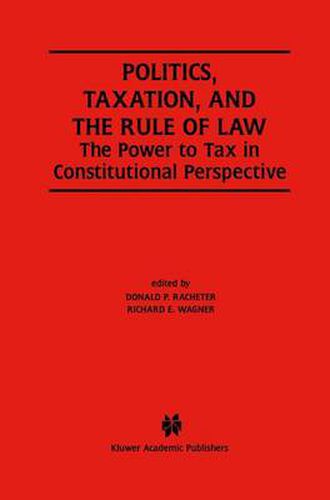Readings Newsletter
Become a Readings Member to make your shopping experience even easier.
Sign in or sign up for free!
You’re not far away from qualifying for FREE standard shipping within Australia
You’ve qualified for FREE standard shipping within Australia
The cart is loading…






This title is printed to order. This book may have been self-published. If so, we cannot guarantee the quality of the content. In the main most books will have gone through the editing process however some may not. We therefore suggest that you be aware of this before ordering this book. If in doubt check either the author or publisher’s details as we are unable to accept any returns unless they are faulty. Please contact us if you have any questions.
The essays in this book treat the relationships among politics, taxation, and the rule of law. A central tenet of democratic ideology is that taxation is something that we choose to do to ourselves, rather than being something that is imposed on us by some ruler. The basic ideology of the American constitutional founding is that government is not the source of our rights of person and property. To the contrary, government is something we establish with our prior rights of person and property to preserve and protect those rights. While it is possible to articulate some intellectual notions about good government and appropriate taxation, it does not follow from the mere fact of this articulation that actual taxation works as articulated. Taxation may be a necessary means of preserving and protecting rights of person and property, but it might also operate in various ways to undermine, abridge, and erode those rights. The central tenet of democratic ideology, a tenet that is reflected thoroughly in the American constitutional founding, is that it is people’s prior right to their property that limits the reach of government. This ideology rejects without a second thought any notion that government defines the limits of people’s right to property. Yet democratic practice may well contradict and subvert democratic ideology, though the relationship between practice and ideology is not so simple as one being dominant over the other.
$9.00 standard shipping within Australia
FREE standard shipping within Australia for orders over $100.00
Express & International shipping calculated at checkout
This title is printed to order. This book may have been self-published. If so, we cannot guarantee the quality of the content. In the main most books will have gone through the editing process however some may not. We therefore suggest that you be aware of this before ordering this book. If in doubt check either the author or publisher’s details as we are unable to accept any returns unless they are faulty. Please contact us if you have any questions.
The essays in this book treat the relationships among politics, taxation, and the rule of law. A central tenet of democratic ideology is that taxation is something that we choose to do to ourselves, rather than being something that is imposed on us by some ruler. The basic ideology of the American constitutional founding is that government is not the source of our rights of person and property. To the contrary, government is something we establish with our prior rights of person and property to preserve and protect those rights. While it is possible to articulate some intellectual notions about good government and appropriate taxation, it does not follow from the mere fact of this articulation that actual taxation works as articulated. Taxation may be a necessary means of preserving and protecting rights of person and property, but it might also operate in various ways to undermine, abridge, and erode those rights. The central tenet of democratic ideology, a tenet that is reflected thoroughly in the American constitutional founding, is that it is people’s prior right to their property that limits the reach of government. This ideology rejects without a second thought any notion that government defines the limits of people’s right to property. Yet democratic practice may well contradict and subvert democratic ideology, though the relationship between practice and ideology is not so simple as one being dominant over the other.